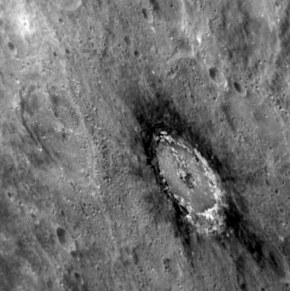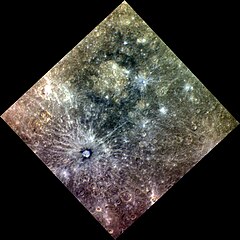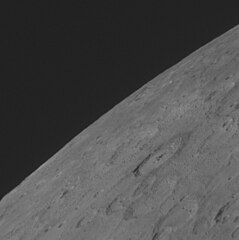Bashō (crater)
 MESSENGER image | |
| Feature type | Impact crater |
|---|---|
| Location | Michelangelo quadrangle, Mercury |
| Coordinates | 32°24′S 170°22′W / 32.4°S 170.36°W |
| Diameter | 74.62 km (46.37 mi) |
| Eponym | Matsuo Bashō |
Bashō is a crater on Mercury named after Matsuo Bashō, a 17th-century Japanese writer.[1] Bashō crater is only 74.62 kilometers (46.37 mi) in diameter,[2] but is a prominent feature on Mercury's surface, due to its bright rays. Photographs from NASA's Mariner 10 and MESSENGER spacecraft show a curious halo of dark material around the crater.[3] The dark material is typically referred to as low-reflectance material (LRM) and there is evidence that it is caused by graphite.[4]
Bashō is one of the largest craters of the Kuiperian system on Mercury. The largest is Bartók crater.[5]
- Mariner 10 image
- Image from MESSENGER's first flyby in January 2008
- MESSENGER image
- Exaggerated color image by MESSENGER, with Tolstoj at top and Bashō in lower left
- Similar image centered on Bashō
- Oblique view from MESSENGER
References
- ^ International Astronomical Union (30 November 1980). Transactions of the International Astronomical Union, Volume XVIIB. Springer Science & Business Media. p. 291. ISBN 978-90-277-1159-5.
- ^ "Bashō". Gazetteer of Planetary Nomenclature. IAU. Retrieved February 11, 2014.
- ^ "Catalog Page for PIA10650". photojournal.jpl.nasa.gov. 2008-05-12. Retrieved 2015-10-16.
- ^ "Mercury's mysterious surface darkness revealed". Astronomy Now. Retrieved 17 June 2024.
- ^ Denevi, B. W., Ernst, C. M., Prockter, L. M., and Robinson, M. S., 2018. The Geologic History of Mercury. In Mercury: The View After MESSENGER edited by Sean C. Solomon, Larry R. Nittler, and Brian J. Anderson. Cambridge Planetary Science. Chapter 6, Table 6.4.






